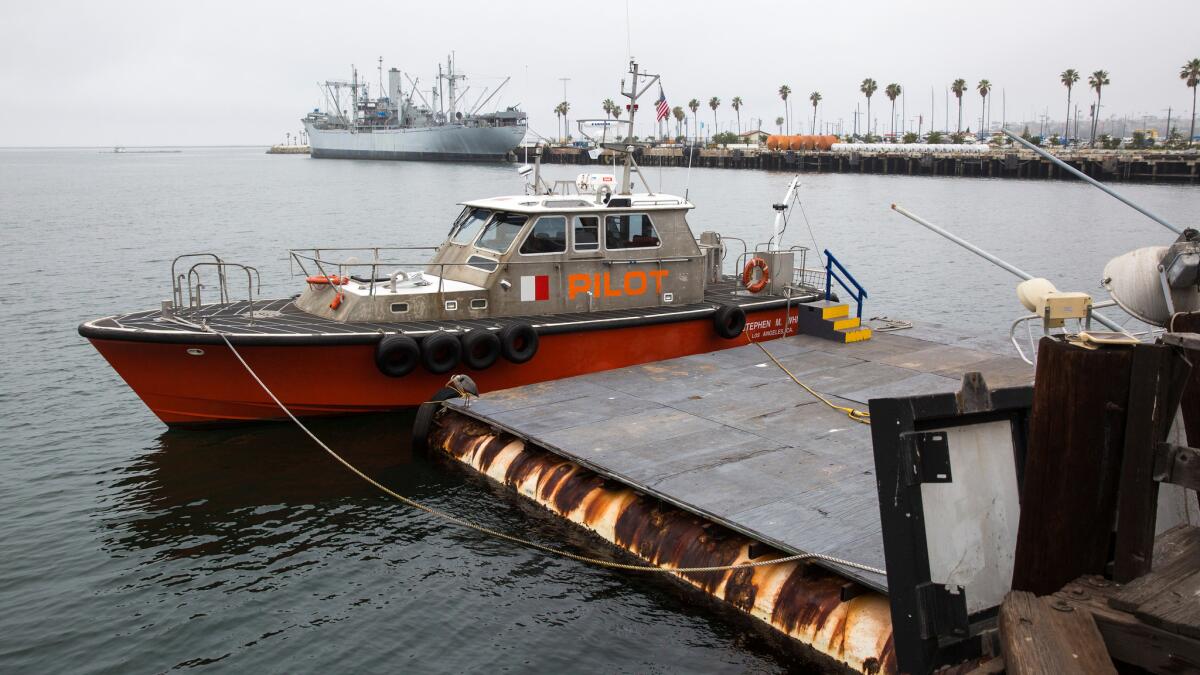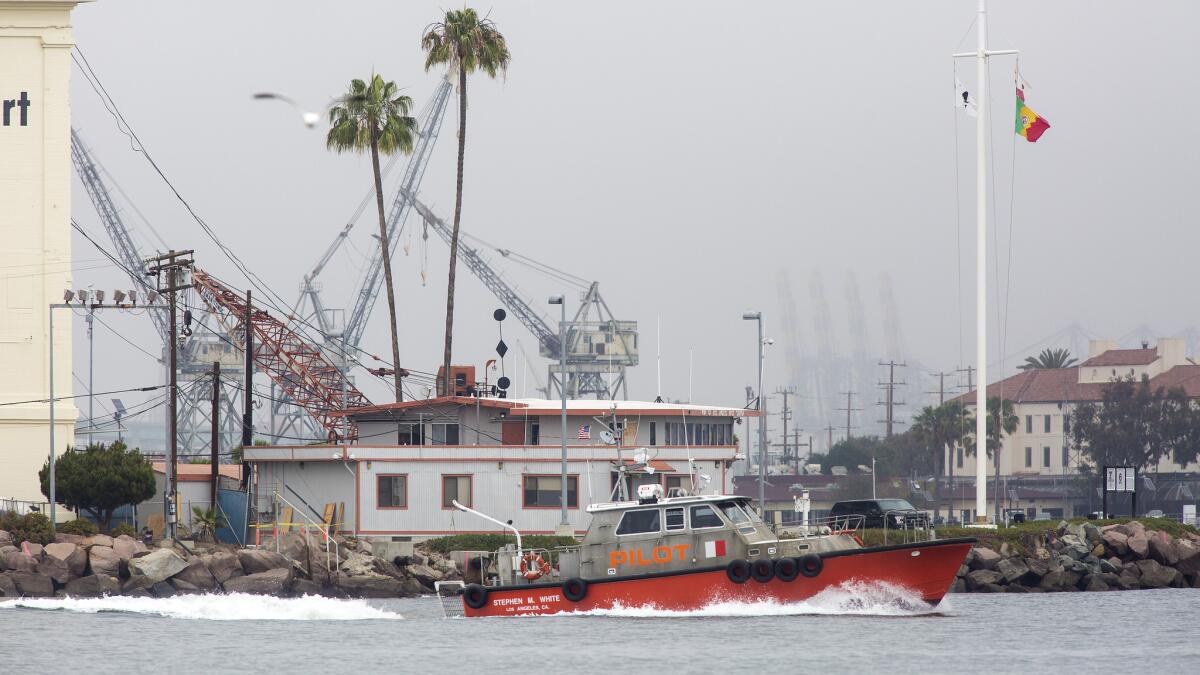How one of L.A.’s highest-paying jobs went to the boss’ son

For seasoned mariners, it was the job opportunity of a lifetime.
A rare opening last year in the city of Los Angeles’ small corps of port pilots, who guide cargo ships and oil tankers into the harbor in San Pedro, drew more than 50 applicants, including ship’s captains and tugboat skippers with many years of experience.
That was no surprise, considering L.A.’s full-time port pilots averaged $434,000 in salary and bonuses last year, making them by far the city’s highest-paid employees.
The surprise came when the job went to 33-year-old Michael J. Rubino, whose father is Chief Port Pilot Michael R. Rubino.
The younger Rubino was hired at the recommendation of an interview panel whose senior member was a longtime colleague of his father, port records obtained by The Times show, but the job didn’t last long. The leader of the small pilots’ union questioned Rubino’s credentials and asked that the work history he and other candidates listed on their applications be carefully checked — something city officials admit they initially failed to do.
It turned out Rubino’s application overstated his tenure as a tugboat captain in San Pedro Bay, a key job requirement, according to Harbor Department emails obtained by The Times. As a result, about a month after Rubino began work in September 2015, he was terminated for “failure to meet the minimum qualifications,” city records show.
Rubino could not be reached for comment. But he offered his side of the story in an October 2015 letter requesting reinstatement to a training program for pilots in San Francisco Bay, which he had resigned from to take the job in L.A.
“My decision to leave San Francisco was to have the opportunity to work with my father in his last few years before retirement,” Rubino wrote. That chance eluded him because “there are individuals in [the Port of Los Angeles] who are unhappy about me being hired, not because of my actions, but because of my last name.”
City rules forbid employees from playing any role, direct or indirect, in the hiring or supervising of their relatives.
Reached by The Times, the senior Rubino said, “I recused myself from the entire hiring process.”
So many questions I get are tough calls. This is not one of them.
— Jessica Levinson, president of the Los Angeles Ethics Commission
The firing of the younger Rubino followed a string of recent embarrassments for managers of America’s busiest harbor.
The former port police chief was indicted for taking kickbacks from a company doing business with the port and then lying to federal investigators about it. Federal officials dropped the corruption charges, and the former chief pleaded guilty earlier this year to tax evasion and filing a false statement to the FBI.
Last fall, The Times reported that port officials violated a court order by waiving emissions restrictions and allowing vessels for two shipping companies to spew excessive amounts of cancer-causing exhaust into harbor neighborhoods, where studies show residents already suffer from unusually high asthma rates and Southern California’s highest cancer risk from air pollution.
Ethics watchdogs said the Rubino case was also troubling.
“When you’re using taxpayer dollars, particularly so many taxpayer dollars, the job needs to go to the best-qualified person, not the son of a boss,” said Jessica Levinson, president of the Los Angeles Ethics Commission. “So many questions I get are tough calls. This is not one of them.”
::
Port piloting consists of boating out to ships waiting to enter the harbor, climbing a rope ladder to the deck and then standing on the bridge to provide local knowledge, including advice on currents and navigational hazards, as the the vessel is steered through the congested waterway to the dock.
The stakes are high. Misdirection from a pilot while docking a massive container ship could cause millions of dollars in damage and endanger lives, while an error with an oil tanker could trigger an environmental disaster.

Pilots say their specialized knowledge of the bay is one reason they are paid so well, and why experience is so highly prized.
When two pilot jobs became available last year because of retirements, port officials said it was the first time since 2002 there had been any openings in the group, which consists of about a dozen pilots, including two chiefs.
With high pay and convenient work schedules, pilots tend to hold on to their jobs for decades. They work four 12-hour days, followed by four days off, and then three days followed by three days off, according to their contract with the city. They are rarely required to venture more than a few miles from shore.
The captain of a large cargo ship, by contrast, often spends months away from home circling the globe and makes on average less than half of what the L.A. port pilots were paid last year, according to industry data.
In 2015, the city’s highest-paid pilot was Bent Christiansen, the elder Rubino’s co-chief. Christiansen received more than $499,000 in salary and bonuses, city data show. That’s more than twice Mayor Eric Garcetti’s salary.
As with most city employees, recruiting for port pilots is supposed to follow a rigorous, merit-based process under civil service rules, designed to ensure the most qualified applicant is hired.
Rubino would usually sit on the panel that conducts interviews for new port pilots. He didn’t last year because his son was an applicant, port officials said.
Instead, the panel consisted of Christiansen, who has worked with the older Rubino for nearly two decades, the port police chief, Thomas Gazsi, and a fill-in for Rubino, port records show. Christiansen had the responsibility of selecting a replacement for the senior Rubino and he chose Thomas Heberle, president of the Hawaii Pilots Assn., according to port officials.
In an interview, Heberle said he was familiar with the L.A. port and had considered applying for the pilots’ job himself. He added that he was acquainted with the elder Rubino but didn’t know him well, and that it hadn’t been a factor in selecting Rubino’s son for one of the jobs.
“If anything, I think we were a little tougher on him because his dad was the boss,” Heberle said.
Some of the other applicants, though, were angry when they learned of the selection.
“It was beyond my imagination. I was very upset,’’ said Capt. Bob Koehler, 71, an applicant who said he spent 33 years working for the private firm that provides pilots to the neighboring Port of Long Beach.
The minimum experience required for the job, according to the official bulletin posted by the port, is three years working as the captain or first mate on a large ship, three years working full time as a pilot in a major U.S. port, or three years working full time as the master of a tugboat in San Pedro Bay.
On his application, the younger Rubino indicated he had “36 months or more” as a tugboat master in the bay. The application also shows he worked nearly four years for Harley Marine Services, a well-known tugboat company.
After the union questioned his qualifications, city officials asked Rubino to provide documentation from Harley Marine of his time as a tugboat master in San Pedro Bay. He couldn’t -- and after port officials called the company, they concluded that Rubino had spent some of his time working in San Francisco and accumulated 33 or 34 months, at most, as a tugboat master at San Pedro, according to a Harbor Department memo.
Asked how Rubino had been hired without the minimum required experience, Port Director Gene Seroka blamed the city’s personnel department for failing to verify his work history. The personnel agency’s spokesman, Bruce Whidden, said it was the port’s responsibility.
Seroka said the Harbor Department will do all of the vetting for high-level job candidates in the future.
If Rubino had gone to work as a port pilot, Seroka said, he would have reported to Christiansen, rather than his father. In Christiansen’s absence, Seroka added, the chief of port police would have been his supervisor.
The police chief oversees the pilot unit but has no professional experience handling ships, port officials said.
After confronting Rubino about his lack of experience on Sept. 29, port officials put him on unpaid leave but waited a month before firing him. Rubino requested the delay to give him time to find other documentation that might prove he had the required tenure as master of a tugboat. At the same time, he launched his effort to get reinstated in the San Francisco Bay pilot training program, records show.
Pilots in San Francisco also make more than $400,000 per year, according to industry officials, so there is a long waiting list for spots in the training program.
A trainee who resigns has “no right to return,” according to documents provided by the Board of Pilot Commissioners, which regulates pilots in San Francisco.
Nevertheless, the board allowed Rubino back into the training program. The Port of L.A. terminated him Oct. 29, a day after confirming he had been reinstated in San Francisco.
Allen Garfinkle, the San Francisco board’s executive director, said he was “never advised that Rubino was being terminated” by L.A. officials.
ALSO
Ruling on concealed weapons spotlights California’s key role in gun debate
California must set aside delays to truck pollution standards, judge rules
Deadly but little-known: Why scientists are so afraid of the San Jacinto fault
More to Read
Sign up for Essential California
The most important California stories and recommendations in your inbox every morning.
You may occasionally receive promotional content from the Los Angeles Times.












